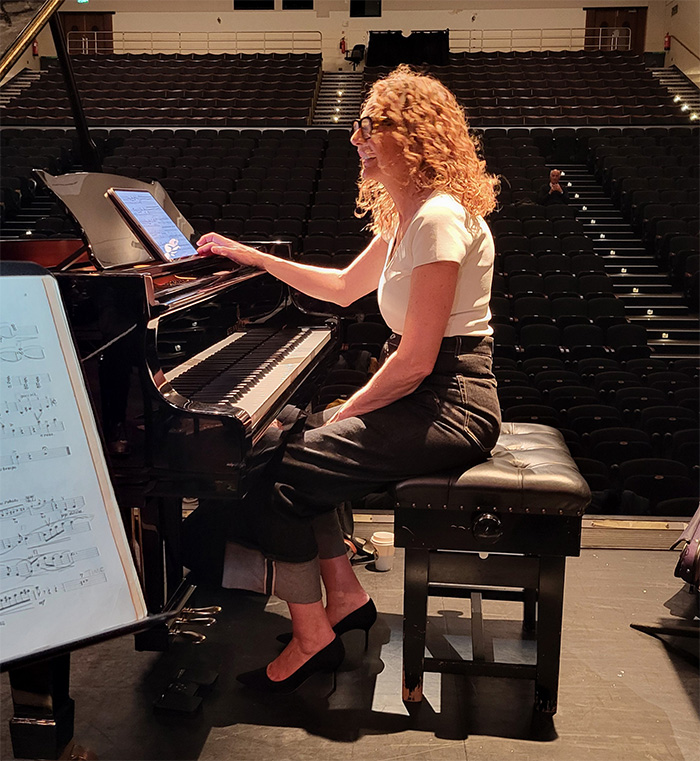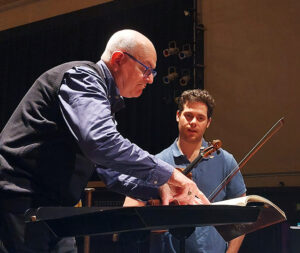What a privilege it was to be in the audience for the RTWSO’s latest concert in the Assembly Hall, on 4th February. There was so much to engage with, absorb and appreciate. In an augmented orchestra, conductor George Vass stepped up to the podium, at short notice to replace Barry Wordsworth who was unfortunately indisposed, to guide the orchestra through a wide variety of orchestral genres.
Renowned pianist Joanna MacGregor wowed us with her performance of Benjamin Britten’s Piano Concerto. She enthralled us with her mastery and interpretation of this demanding concerto and was very ably supported by the RTWSO’s players providing some empathetic solos on viola, clarinet, cor anglais and harp. This concerto is a tricky piece to negotiate, with many changes of mood and tempo. The inner movements have a rather burlesque feel with alternating dreamy and frantic episodes which could be used as very descriptive film music. The outer movements are fast and furious with a flurry of notes for the pianist. At the end there was a long and deserved ovation for Joanna, and then as if what we had just heard wasn’t enough, she gave a delightful encore of Piazzolla’s Milonga del angel. It is difficult to understand why Joanna MacGregor hasn’t performed with the orchestra before – let’s hope it’s the start of many future collaborations.
So how was the great outdoors celebrated? If the concert-goer had thought that it might be a peaceful afternoon, they would have been very much mistaken. There were depictions of two quite different storms, as realised by 2twocomposers born a couple of centuries apart! Both composers, Beethoven and Britten, evoked ‘mood’ music, much of which was left to the listener to interpret and imagine.
The concert opened with the Four Sea Interludes from Peter Grimes by Benjamin Britten – ‘Dawn’, ‘Sunday Morning’, ‘Moonlight’ and ‘Storm’ on the Suffolk coast. Britten knew the area well having lived there for most of his life. His music caught the often stark, desolate landscape. A member of the audience who lives in Suffolk said that in ‘Dawn’ he could vividly imagine being on the beach at Southwold, seeing the dawn break. Composer and orchestra alike had captured that particular moment. Britten’s ‘storm’ was wild and dramatic conjuring up a maelstrom of activity by the sea.
What of the other ‘storm’? Beethoven’s Symphony No 6 Pastoral has five, not the usual four, movements, one of which is the famous storm. Loving his walks in the countryside Beethoven had obviously experienced the onset of a storm and in this movement he demonstrates very graphically the havoc it caused to the bucolic revelries and pastimes of the peasants. The symphony was composed in 1808 in the ‘Classical’ period so it allegedly has form and structure. But this is Beethoven, so expect the unexpected, and in the case of this early example of Programme music, his storm arrives unexpectedly with daring orchestral effects. The peasants’ merry-making of the earlier movements, with the use of a drone (of the musical, not airborne, variety) to set the rustic scene, gives way suddenly to violent, noisy crashings on the timpani and loud, fast, frenetic string playing. Being at a live concert somehow made this experience even more tingling, something that a studio recording, however good, cannot necessarily achieve for the listener. Full marks to the orchestra, especially to John Rockliffe on timpani, for bringing off this effect. The symphony ends in all sweetness and light after the storm has passed through, and with the RTWSO also probably feeling the same sense of relief!



